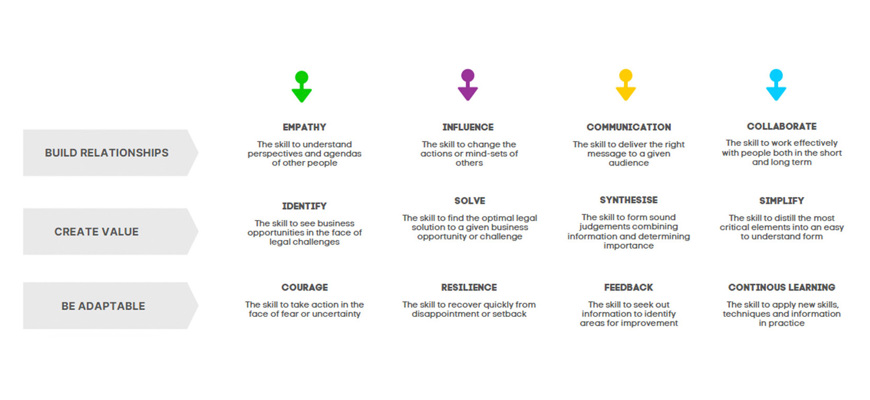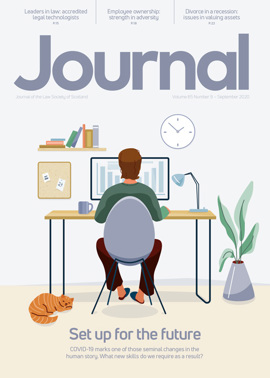Full circle: the way ahead

Are you an O shaped lawyer? This is not a comment on anyone’s diet and exercise habits since the COVID-19 lockdown, but a challenge based on a programme that takes a fresh look at the skills and competencies needed to be a successful lawyer from the eyes of the customer.
Its starting position is that the technical, analytical skills which are the longstanding hallmark of a lawyer need to be supplemented by additional skills and competencies. Developed last year by a group of UK lawyers, the purpose of the O Shaped Lawyer Programme is simple – to make the legal profession better: better for those who work in it, for those who use it, and for those who are entering it. This is a bold ambition, so what is this programme?
At its heart, the O shaped lawyer is about mastering more human-centric behaviours and attributes under three pillars:
- first, competencies to build successful long-term professional relationships, whether between lawyer and customer, between in-house and law firm, or between colleagues;
- secondly, competencies which will enable a lawyer to adapt to the changing legal landscape and to help them develop and thrive in their legal career;
- thirdly, competencies to support customers, to understand priorities and goals and to identify opportunities to find the best legal solutions and create value for the client.
These are not new requirements, but those leading on the O Shaped Lawyer Programme believe the time is ripe for change. Why?
The legal services market is in a state of change. External factors such as new legal service providers entering the market, the potential for technology to disrupt the traditional role of the lawyer, the increasing expectations of clients demanding “more for less”, and more innovative solutions, will impact the traditional legal services model. Internal factors within the profession are also driving change. The challenges to become more diverse and inclusive, and to respond to the concerns raised around mental health and the wellbeing of members, are two examples. Lawyers who develop and adopt a broader set of skills and behaviours will be best placed not only to meet these challenges but to make the most of opportunities that changes will bring.
O shaped is three by four, over five
The O Shaped Lawyer Programme started life as a group of likeminded individuals who wanted to make a positive difference to the profession. Their goal was to create a model which did not just advocate for a broader skillset for lawyers, but which spoke with the customer voice and was practical in its application. To do so, the group started by interviewing 18 GCs of FTSE 350 entities to understand the attributes and skills that lawyers must acquire to become valued partners with their customers. This research highlighted 12 attributes of an O shaped lawyer which fall under the three pillars mentioned above (building relationships, being adaptable and creating value): see figure 1 (graphic above).
These attributes sit within a framework of five “O shaped” behaviours which drive not just the actions of the programme, but which the group likewise views as the mindset which successful O shaped lawyers will need to adopt: see figure 2 (graphic below).
So, what do these attributes mean in practice?
Focusing on “empathy” (also known as EQ) as an illustrative example, it is clear that high levels of EQ are becoming increasingly recognised as a necessary component of leadership which differentiates the great from the good. Yet all too often it is IQ, assessed through exam results and technical knowledge, which is given far greater weight in determining recruitment and career progression. EQ is rarely discussed, and more rarely still, actively developed. Yet the research of the O Shaped Lawyer Programme has shown that though EQ may be termed a “soft skill”, it is a hard requirement to drive value for customers.
Consider the following examples of behaviour which demonstrate high levels of EQ, and the impact each might have on building long term and successful relationships with colleagues and clients:
- putting yourself in other people’s shoes to support informed decision-making;
- not seeking to blame others;
- acknowledging the contributions of others and celebrating their successes;
- giving praise when deserved without being overly concerned about taking credit;
- developing self-awareness (i.e. reading your own emotions and knowing your strengths and limitations);
- developing self-management/self-regulation (i.e. being able to control your emotions in a healthy and constructive way);
- demonstrating and promoting social awareness;
- promoting relationship management through a focus on social skills.
Viewing just one element of the 12 attributes in this way, the impact of their exercise on a relationship between lawyer and customer becomes apparent. The attributes may even seem obvious, yet they are rarely actively developed, whether for those in the profession or for those completing legal education to enter the profession in the future. In combination, they have the potential to create lawyers capable of developing powerful and value-driven relationships.
Bringing O shaped lawyers to life
Identifying behaviours and attributes is helpful, but on its own it isn’t going to change the dial. A core feature of the O Shaped Lawyer Programme is its focus on bringing the 12 attributes to life, within the framework of the five O shaped behaviours. To achieve true practical application, the programme focuses on two separate but interlinked workstreams:
The education stage
A core objective of the O Shaped Lawyer Programme is to see legal education modernised to better reflect the skills and competencies needed to be a successful lawyer. While technical knowledge and its practical application remain core, the programme’s aim is to embed the O shaped attributes into training for the profession. In England, the University of Law (U-Law) will shortly pilot a one-day course for trainees and junior lawyers on the “building relationships” pillar, with later courses on the other two pillars also planned. Several universities and law schools have also expressed an interest in either developing specific modules or embedding the attributes throughout their programmes. While it is early days, it is encouraging to see legal educators and legal practitioners coming together to discuss the skillsets needed to be a lawyer.
The O Shaped Lawyer Programme will continue to collaborate with universities and law schools to ensure that legal education, which is so rarely viewed afresh, places a much greater emphasis on the building of more rounded lawyers, utilising the framework that the programme has put in place.
The practice stage
Strengthening the relationship between lawyers and their customers (including between private practice and in-house lawyers, and both types of lawyers and their end customer) is a core objective of the O Shaped Lawyer Programme. It is within the practice stream that true practical application of O shaped attributes and behaviours can be tested and refined.
To foster practical application, and to test the impact of new O shaped initiatives properly, the programme has developed a pilot scheme for in-house legal teams and law firms to explore new ways of working together in a safe environment based on the three customer-centric pillars of building relationships, being adaptable, and creating value. The purpose is to use O shaped behaviours and attributes in a real-life, real-time working environment for them to improve the relationship with each other, and look together at how the service to the end customer can be improved. These pilots offer a safe environment which encourages open and honest discussions. Already, pilot groups are reporting tremendous progress, with one senior in-house lawyer commenting: “Since starting the pilot I have had some of the most open discussions I have ever had with the external lawyers that support our business.”
To date, six pilots are operating, with more in the pipeline. The outcomes are intended to be shared across not just the wider customer and law firm relationship, nor only in the relevant law firm, but with the wider legal community. In this way, the findings will also inform the education stream.
Be part of the discussion
The O Shaped Lawyer Programme has existed for less than a year, yet in that short space of time its vision of a legal profession which puts people first, its aim to make the legal profession better for everyone involved in it, and its engagement with legal educators and legal practitioners alike to help make this happen, have found a receptive audience. The programme recognises that there will be profound changes to the provision of legal services in the years to come; and that lawyers will need to adapt to meet changes as well as continue to meet client expectations. There is a spotlight shining on the profession’s ability to respond to the gap in diversity and inclusion, and on how wellbeing and welfare are dealt with. Good work is already taking place to understand and respond to this diverse range of challenges. The O Shaped Lawyer Programme hopes to play its part: putting people first, and shifting the dial so that a lawyer’s technical expertise is complemented by a broader palate of behaviours and attributes which are not only recognised and valued, but are also embedded into a lawyer’s development throughout their legal career.
The programme’s vision is for lawyers to master attributes which will put them in the best position to meet the challenges and opportunities facing the legal profession, which help a lawyer to develop and thrive in their legal career, which create more rounded lawyers who can deliver better value to their customers, and, just maybe, which help to make the profession better for everyone involved.

Find out more
If the O Shaped Lawyer Programme resonates with you, or to find out more, join our O Shaped LinkedIn group and visit our website, both of which contain lots more information. If you are interested in getting involved, please join the mailing list or contact me.
Regulars
Perspectives
Features
Briefings
- Civil court briefing: Lessons from a video proof
- Corporate briefing: Business support: going our own way
- IP briefing: China – a friendlier place for IP rights?
- Agriculture briefing: Was there a croft here?
- Scottish Solicitors' Discipline Tribunal
- Planning obligations: seeking better practice
- Construction briefing: Rough justice, smoother delivery







